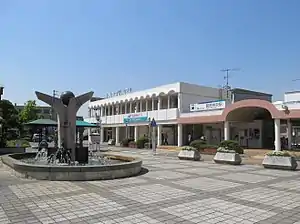Hekinan
Hekinan (碧南市, Hekinan-shi) is a city located in Aichi Prefecture, Japan. As of 1 October 2019, the city had an estimated population of 72,864 in 29,139 households,[1] and a population density of 1,986 persons per km². The total area of the city was 36.68 square kilometres (14.16 sq mi).[2]
Hekinan
碧南市 | |
|---|---|
 Kokonoe Mirin Co., Ltd. | |
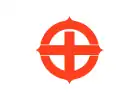 Flag  Seal | |
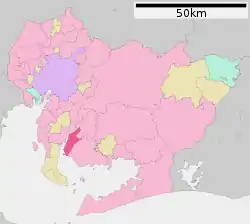 Location of Hekinan in Aichi Prefecture | |
 Hekinan | |
| Coordinates: 34°53′4.9″N 136°59′36.3″E | |
| Country | Japan |
| Region | Chūbu (Tōkai) |
| Prefecture | Aichi |
| Area | |
| • Total | 36.68 km2 (14.16 sq mi) |
| Population (October 1, 2019) | |
| • Total | 72,864 |
| • Density | 2,000/km2 (5,100/sq mi) |
| Time zone | UTC+9 (Japan Standard Time) |
| - Tree | Oak |
| - Flower | Japanese iris |
| Phone number | 0566-41-3311 |
| Address | 28 Matsumoto-chō, Hekinan-shi, Aichi-ken 447-8601 |
| Website | Official website |
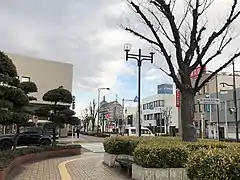
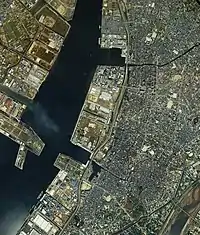
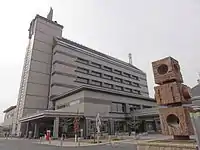
Geography
Hekinan is located in south-central Aichi Prefecture, and is surrounded by Lake Aburagafuchi, the Yahagi River, Kinuura Bay, and Mikawa Bay. Most of the city area lies on reclaimed ground, with an average elevation of under seven meters above sea level.
Demographics
Per Japanese census data,[3] the population of Hekinan has been increasing steadily over the past 50 years.
| Year | Pop. | ±% |
|---|---|---|
| 1950 | 45,491 | — |
| 1960 | 50,116 | +10.2% |
| 1970 | 56,933 | +13.6% |
| 1980 | 62,021 | +8.9% |
| 1990 | 65,899 | +6.3% |
| 2000 | 67,814 | +2.9% |
| 2010 | 72,020 | +6.2% |
Climate
The city has a climate characterized by hot and humid summers, and relatively mild winters (Köppen climate classification Cfa). The average annual temperature in Hekinan is 15.7 °C. The average annual rainfall is 1609 mm with September as the wettest month. The temperatures are highest on average in August, at around 27.6 °C, and lowest in January, at around 4.6 °C.[4]
Climate
Gamagōri, Aichi is the closet point that measures climate information.
| Climate data for Gamagōri, Aichi (1971–2000) | |||||||||||||
|---|---|---|---|---|---|---|---|---|---|---|---|---|---|
| Month | Jan | Feb | Mar | Apr | May | Jun | Jul | Aug | Sep | Oct | Nov | Dec | Year |
| Average high °C (°F) | 9.2 (48.6) |
9.7 (49.5) |
13.2 (55.8) |
18.5 (65.3) |
22.7 (72.9) |
25.5 (77.9) |
29.2 (84.6) |
30.9 (87.6) |
27.4 (81.3) |
22.2 (72.0) |
17.1 (62.8) |
11.9 (53.4) |
19.8 (67.6) |
| Daily mean °C (°F) | 5.3 (41.5) |
5.5 (41.9) |
8.9 (48.0) |
14.2 (57.6) |
18.5 (65.3) |
21.9 (71.4) |
25.5 (77.9) |
26.9 (80.4) |
23.6 (74.5) |
18.3 (64.9) |
13.1 (55.6) |
8.0 (46.4) |
15.8 (60.4) |
| Average low °C (°F) | 2.0 (35.6) |
1.9 (35.4) |
4.9 (40.8) |
10.1 (50.2) |
14.7 (58.5) |
18.8 (65.8) |
22.6 (72.7) |
23.8 (74.8) |
20.7 (69.3) |
14.9 (58.8) |
9.6 (49.3) |
4.5 (40.1) |
12.4 (54.3) |
| Average precipitation mm (inches) | 47.9 (1.89) |
59.2 (2.33) |
135.9 (5.35) |
149.5 (5.89) |
178.7 (7.04) |
231.5 (9.11) |
175.3 (6.90) |
157.5 (6.20) |
257.2 (10.13) |
127.8 (5.03) |
93.0 (3.66) |
38.9 (1.53) |
1,649.8 (64.95) |
| Mean monthly sunshine hours | 169.3 | 173.6 | 192.9 | 196.4 | 190.9 | 137.0 | 163.9 | 215.4 | 150.4 | 168.3 | 169.2 | 183.9 | 2,110.7 |
| Source: [5] | |||||||||||||
History
The area is part of ancient Mikawa Province. Under then Edo period, Tokugawa Shogunate, much of what is now Hekinan was part of the holdings of Numazu Domain, with the remainder being tenryō territory under direct control of the shogunate. Widespread rioting occurred in the area against the new Meiji government and its policy of shinbutsu bunri in 1871. the area was organized into towns and villages within Hekikai District by the Meiji period establishment of the modern municipalities system in 1889. The towns of Ohama, Shinkawa and Tanao, and the village of Asahi merged on April 5, 1948 to form the city of Hekinan[2] As it is located on the southern (南) part of Hekikai District (碧海郡), the city was named Hekinan (碧南). Hekinan was the tenth city founded in Aichi Prefecture.[2] Since it had harbors and rails, the city developed quickly after Pacific War.
On April 1, 1955, one part of the village of Meiji, which is currently called Nishibata, was incorporated into Hekinan.
On September 26, 1959, Typhoon Vera also known as the “Isewan Typhoon” heavily damaged the city.
On July 14, 1974, Rinkai Kōen Pool or also known as Kinuura Mammoth Pool was opened. Because the city reclaimed the seaside for industrial purposes in 1960's, Hekinan opened this pool for people who complained about losing their beautiful beach. On May 23, 1988, Hekinan Municipal Hospital was opened.[6] In 1993, Hekinan Thermal Power Station was created by Chubu Electric Power on the reclaimed ground. This provides high tax revenue to the city. On August 17, 2003, since the facility of the Rinkai Kōen Pool became old and the number of the visitors of the pool was reduced, the city shut down the pool. Instead, the city created Hekinan Rinkai Park on the same place.
Government
Hekinan has a mayor-council form of government with a directly elected mayor and a unicameral city legislature of 22 members, which is considerably higher than other cities of similar size. The city contributes one member to the Aichi Prefectural Assembly. In terms of national politics, the city is part of Aichi District 13 of the lower house of the Diet of Japan.
Economy
Hekinan is one of the wealthiest cities in Japan. Its financial capability index is 1.70.[7] Automile-related components, metal, tile, and food processing are the main industries in the city. In 2006 the number of factories was 463 with 16,778 workers. The value of shipments was 84,356,533 million yen in total in 2006.[8] The Hekinan Thermal Power Station is one of largest thermal power plants in the world.[9]
Industry
- Automobile
In 2010, there were 9,148 people working in this industry, shipping products worth 47,058,959 yen which is more than half of the amount of shipments in the city.[8] Toyota Industries is the biggest company for the industry in the city. There were 1,722 Toyota employees in Hekinan, or about 10% of the total industrial workers in the city in 2010.[10]
- Ceramic tile
One remarkable industry in the city is related to ceramic roofing tiles. Hekinan is one of the cities that produce Sanshu kawara, a well-known regional brand. In Japan, 58 per cent of tiles, which is about 50,000,000 tiles, are Sanshu kawara.[11]
Education
Hekinan has seven public elementary schools and five public junior high schools operated by the city government, and two public high schools operated by the Aichi Prefectural Board of Education. The prefecture also operates one special education school for the handicapped.
High schools
- Hekinan High School
- Hekinan Technical High School
Middle schools
- Hekinan Shinkawa Middle School
- Hekinan Chūō Middle School
- Hekinan Nishibata Middle School
- Hekinan Higashi Middle School
- Hekinan Minami Middle School
Elementary schools
- Hekinan Ōhama Elementary School
- Hekinan Shinkawa Elementary School
- Hekinan Tanao Elementary School
- Hekinan Chūō Elementary School
- Hekinan Nishibata Elementary School
- Hekinan Nisshin Elementary School
- Hekinan Washizuka Elementary School
International schools
- Escola Alegria de Saber (エスコーラ・アレグリア・デ・サベール) - Brazilian school (Ensinos Fundamental e Médio)[13]
Transportation
Railway
![]() Meitetsu – Meitetsu Mikawa Line
Meitetsu – Meitetsu Mikawa Line
- (Takahama) - Kitashinkawa - Shinkawamachi - Hekinan Chūō - Hekinan (Terminus)
![]() Kinuura Rinkai Railway - Hekinan Line
Kinuura Rinkai Railway - Hekinan Line
- (Takahama) - Hekinanshi - Gongenzaki (Terminus)
National Route
Prefectural road
- Aichi Prefectural road 43
- Aichi Prefectural road 45
- Aichi Prefectural road 46
- Aichi Prefectural road 50
- Aichi Prefectural road 265
- Aichi Prefectural road 291
- Aichi Prefectural road 295
- Aichi Prefectural road 301
- Aichi Prefectural road 302
- Aichi Prefectural road 303
- Aichi Prefectural road 304
- Aichi Prefectural road 305
- Aichi Prefectural road 306
- Aichi Prefectural road 307
International relations
Twin towns — Sister cities
Hekinan is twinned with:
In April, 2005, the Deputy Prime Minister of Croatia visited to Hekinan in order to participate in Expo 2005. During the stay, the Vice Prime Minister proposed to have a sister cities relationships between Croatian cities. Hekinan sent officials to Pula in 2006. On April 5, 2007, Hekinan invited the Mayor of Pula for the 59th anniversary and established a sister city relationship between the two cities.[15]
In order to build Hekinan citizen's international sensibility, the city was looking for a sister city relationship with a city in the Pacific Ocean coast. At the same time, Edmonds considered to have the relationship with one of Japanese cities. Edmonds sent officials to Hekinan in 1986. The two cities started exchanging people for home stay. Two years later, at the ceremony of 40th anniversary of Hekinan, the two cities established a sister-cities relationship.[16]
- Events between Hekinan and Edmonds
- On April 5, 1988, Hekinan and Edmonds established a sister city relationship.[17]
- In 1998, the Hekinan city hall hosted the sculpture by Steve Jensen to celebrate 10th anniversary of the relationships.
- In 2004, Twenty five Hekinan artists, residents, and officials visited Edmonds to dedicate the Friendship Tree on the Edmonds waterfront.
- In 2008, Mayor Gary Haakenson visited Hekinan with 18 citizens to celebrate 20th anniversary[18]
About 20 people from Hekikaigun moved to Yuni, Mikawa. Since the sounds of the regions were the same, they developed this region very well. This connection made two cities have the sister city relationship at the same date that Edmonds signed the relationship between Hekinan.[19]
Local attractions
- Hekinan Rinkai park
- Hekinan Sea Side Aquarium (碧南海浜水族館)
- Hekinan Rinkai Gym
- Hekinan Rinkai park ground
- Aoi park
- Mugaen - Philosophy Taiken Village
- Akashi Park
- Hekinan Tatsukichi Fujii Museum of Contemporary Art
- Myōfuku-ji (妙福寺/志貴毘沙門天)
- Shōmyō-ji - A temple related to Tokugawa Ieyasu.
 Hekinan Rinkai park
Hekinan Rinkai park Aoi park
Aoi park Akashi Park
Akashi Park Hekinan Tatsukichi Fujii Museum of Contemporary Art
Hekinan Tatsukichi Fujii Museum of Contemporary Art Shōmyō-ji
Shōmyō-ji Aburagabuchi park
Aburagabuchi park
Festivals
Various festivals are held throughout the year in Hekinan.
| Name | Date | Location | Details |
|---|---|---|---|
| Cherry Blossom Festival | From March to April | Onin-ji, Akashi Park, Nakayamashinmei shrine, Yahagi river | Many events related to cherry blossoms. During nighttime, the trees are illuminated along the Yahagi River. |
| Shiki Bishamonten Spring Festival | April 3 | Myōfuku-ji (妙福寺/志貴毘沙門天) | Pray for your and your family's happiness. |
| Nishiōninji Rennyohi | From April 19 to 25 | Ōnin-ji | Buddhist event. Tea ceremony and other events held. |
| Spring Rennyo walking | April | Ōnin-ji | "Walk-rally", Haiku contests, etc. are held. |
| Kōtō Garden Wisteria Festival | From April to May | Kōtō Garden | Enjoy Wistaria. There are a tea ceremony, which costs 500 yen including Japanese snack. During the night time, wistaria is illuminated by paper lanterns. |
| Shōmyō-ji Tōshō-gū Festival | May 5 | Shōmyō-ji | A lot of cultural assets, especially assets that related to Tokugawa, are treasured. Tokugawa Ieyasu's ancestor's graves exist in the temple. Variety of the events are held. |
| Henjō-in Three faces Jikokuten Spring Festival | May 5 | Henjō-in | Pay for success in business, etc. |
| Hekinan Lake Aburagafuchi Oak Festival[note 3] | From May to June | Lake Aburagafuchi and Ōnin-ji | Art contests, Tea ceremony, etc. are held. There are about 3 million oak trees, more than 100 types of oak tree illuminated by paper lanterns at night. |
| Saigu Jinja Hydrangea Festival | Second Sunday of June | Saigu Jinja | Selling Hydrangea, Nagashi Sōmen events are held. |
| Abacus Festival | August 8 (8-8 pronounce like abacus' sound so August 8 is Abacus day) | Shōmyō-ji | Thanksgiving for old abacus. |
| Lake Aburagafuchi fishing contests[note 4] | Second Sunday of September | Lake Aburagafuchi | Free fishing contest at Lake Aburagafuch |
| Ōhama Teramachi "Haiking" (Haiku Festival)[note 5] | Third Sunday of October | Ōhama | Haiku contests. The theme of Haiku is town. Participants walk around Ōhama and writing haiku poetry. |
| Shiki Bishamonten Fall Festival | November 3 | Myōfuku-ji (妙福寺/志貴毘沙門天) | Pray for your and your family's happiness. |
| Henjō-in Three faces Daikokuten Fall Festival | November 11 | Henjō-in | Pay for success in business, etc. |
Notable people from Hekinan
- Hideaki Ōmura, politician
- Kenzo Suzuki, professional wrestler
Notes
- "碧南市観光協会ホームページ さくらまつり". Archived from the original on 13 April 2011. Retrieved 23 July 2010.
- "碧南市観光協会ホームページ 広藤園 藤まつり". Archived from the original on 7 May 2010. Retrieved 23 July 2010.
- "碧南市観光協会ホームページ へきなん花しょうぶまつり". Archived from the original on 11 July 2010. Retrieved 23 July 2010.
- "碧南市観光協会ホームページ へきなん油ヶ渕つり大会". Archived from the original on 12 June 2011. Retrieved 23 July 2010.
- "碧南市観光協会ホームページ 大浜てらまち俳句ing(はいきんぐ)". Archived from the original on 15 March 2011. Retrieved 23 July 2010.
References
- Hekinan City official statistics (in Japanese)
- "碧南はこんなまち". Retrieved 5 July 2019.
- Hekinan population statistics
- Hekinan climate data
- "気象庁 / 平年値(年・月ごとの値) 蒲郡". Retrieved 22 July 2010.
- "碧南市民病院改革プラン" (PDF). Archived from the original (PDF) on 12 June 2011. Retrieved 6 July 2010.
- "平成20年度市町村決算カード 愛知" (PDF). Retrieved 22 July 2010.
- "業種別・事業所数・従業者数・出荷額等の推移". Archived from the original on 12 June 2011. Retrieved 22 July 2010.
- industcards. "The Top 100 - World's Largest Power Plants". Power Plants Around the World. Retrieved October 1, 2019.
- "主要国内拠点 碧南工場". Retrieved 22 July 2010.
- "三州瓦の紹介". Retrieved 22 July 2010.
- "碧南市の農業". Archived from the original on 20 August 2010. Retrieved 22 July 2010.
- "Escolas Brasileiras Homologadas no Japão" (Archive). Embassy of Brazil in Tokyo. Retrieved on October 13, 2015. "Endereço: 4-53 Tajiri-cho, Hekinan-shi, Aichi-ken 447-0867"
- "Međunarodna suradnja Grada Pule". Grad Pula (in Croatian and Italian). Archived from the original on 2012-05-05. Retrieved 2013-07-28.
- "もっと知りたい!碧南姉妹都市 クロアチア" (PDF). Archived from the original (PDF) on 12 June 2011. Retrieved 12 July 2010.
- "エドモンズ市(アメリカ合衆国ワシントン州)". Archived from the original on 12 June 2011. Retrieved 12 July 2010.
- "City of Edmonds, Washington - Sister City Commission". Archived from the original on 29 July 2010. Retrieved 12 July 2010.
- "City of Edmonds, Washington - Sister City Commission - History". Archived from the original on 18 November 2009. Retrieved 12 July 2010.
- "由仁町(北海道夕張郡由仁町)". Retrieved 12 July 2010.
- "碧南市観光協会ホームページ". Archived from the original on 9 January 2010. Retrieved 23 July 2010.
External links
| Wikimedia Commons has media related to Hekinan, Aichi. |
- Official website (in Japanese)
- Hekinan City official website (in English)
- Hekinan Rinkai Park (in Japanese)
- Hekinan city Tatsukichi Fujii Museum of Contemporary Art (in Japanese)
- Hekinan Akashi Park (in Japanese)
- Mugaen (in Japanese)
